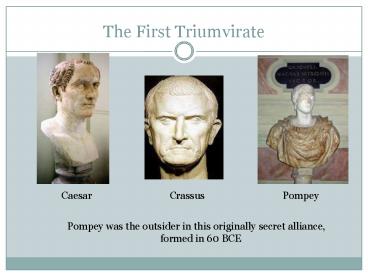The First Triumvirate - PowerPoint PPT Presentation
1 / 15
Title:
The First Triumvirate
Description:
... Octavian Formed in 43 BCE, this triumvirate also succumbed to jealousy and ambition. Why does any last hope of Republic die with the 2nd Triumvirate? – PowerPoint PPT presentation
Number of Views:175
Avg rating:3.0/5.0
Title: The First Triumvirate
1
The First Triumvirate
Caesar
Pompey
Crassus
Pompey was the outsider in this originally secret
alliance, formed in 60 BCE
2
Julius Caesar
- Born to a patrician family around 100 BCE
- Early life was a time of turmoilmarriages,
affairs, etc. - Served in the army outside of Rome
- Waited for the death of Sulla before returning to
Rome
3
The First Triumvirate
Crassus used part of the Roman army to expand the
Republics territory to the east, Caesar did the
same to the north, and Pompey stayed in Rome
4
- 63 BCE, Caesar elected to the office of Pontifex
Maximus (highest priest of the Roman state
religion) - 50s BCE- as part of the 1st Triumvirate, Caesar
governs Gaul - Conquers Gaul by 51 BCE
- Ordered back to Rome, crosses Rubicon w/ army in
49 BCE
5
The First Triumvirate
Seven years after the formation of the 1st
Triumvirate, Crassus died in battle and Pompey
campaigned to be Romes only consul
Caesar returned to Italy in 49 BCE to challenge
Pompey (Roman law forbade generals from crossing
the Rubicon River with a standing army)
6
The First Triumvirate
A civil war ensued Caesar defeated Pompey
Coin minted to pay Caesars troops
7
Julius Caesar in charge
Caesar never married Pharaoh Cleopatra VII, the
Queen of Egypt with whom he allied, although they
did (probably) have a son together
Caesar, who admired Alexander the Great, spent
the next four years further expanding the Roman
Republic
8
Julius Caesar in Charge
- 46 BCE- Dictator for 10 years
- 45 BCE- Dictator Perpetuus
- Instituted reforms and building projects
- Calendar
- Senate- 900 members
- Citizenship to conquered peoples (esp. Gaul)
9
Assassination of Caesar
Roman senators, led by Brutus and Cassius,
assassinated Caesar in 44 BCE (motives included
jealousy, protection of the Republic, and anger
about the spent by Caesar)
Caesars friend Mark Antony, Caesars great
nephew (and adopted son) Octavian, and Marcus
Lepidus hunted down those involved in the
assassination and then formed the 2nd Triumvirate
10
AssassinationMarch 15, 44 BCE
- Et tu, Brute?
11
What does Caesars death mean?
- End of the republic?
- Deification
- Octavian is the heir
12
The Second Triumvirate
Antony
Lepidus
Octavian
Formed in 43 BCE, this triumvirate also succumbed
to jealousy and ambition. Why does any last hope
of Republic die with the 2nd Triumvirate?
13
The Second Triumvirate
Antony married Octavians sister but lived and
had children with Cleopatra VII (who had also had
a child with Julius Caesar)
Octavian raised an army and defeated Lepidus,
then at Actium defeated Antony and Cleopatra, who
committed dual suicide in 31 BCE
14
Octavian In Charge
- Many people consider the Battle of Actium to mark
the end of the Republic and the beginning of the
Empire - Other people say that the Republic died under
Julius Caesar - Still others say that the Republic did not die
until the Senate gave Octavian the title Augustus
the illustrious one in 27 BCE
15
Augustus (27 BCE and beyond)
- 31 BCEBeginning of Pax Romana (lasted until 180
CE) - Served as Pontifex Maximus (high priest)
- Purged the Senate to 600 members
- Fire and police departments
- Put permanent employees in the government, made
army professional - Public buildings and roads
- Rebuilt Rome (bricks to marble)
- Biggest external problempeople to the north
- Carefully chose his own successor, but did not
clearly declare how others should do it in the
future - Why were the Romans willing to accept Augustus
abandonment of Republican ideals?































